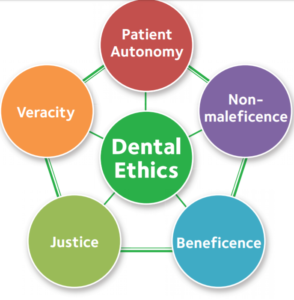Principles and Ethics
The Principles of Ethics are the aspirational goals of the profession. They
provide guidance and offer justification for the Code of Professional Conduct and the Advisory Opinions.
There are five fundamental principles that form the foundation of
the Code: patient autonomy, nonmaleficence, beneficence, justice, and veracity. Principles can overlap each other as well as compete with each other for priority.
More than one principle can justify a given element of the Code of Professional Conduct. Principles may at times need to be balanced against each other, but, otherwise, they are the profession’s firm guideposts.
Our objectives- Understand what is meant by ethics in Dentistry.
• Understand the term “profession” and how it relates to ethics in dentistry.
• Become familiar with elements and principles of ethical decision making.
• Understand the ethics of patient relations, a delegation of duties, substance abuse in dentistry, financial arrangements, and managed care.
• Understand the difference between dental law and dental ethics.
• Define the normative theories of ethics and apply them to ethical issues in
practice.
• Understand and apply the principles of dental ethics in everyday practice.
The 5 promises dentist makes to their patients-
- Respect a patient’s wants and needs- As a patient, you have the right to be involved in decisions about your treatment and to expect privacy and confidentiality. The code reminds all dentists that they have the duty to put the patient first, to involve the patient in treatment decisions in a meaningful way, and to treat the patient taking into account the patient’s desires, as long as those desires are within the bounds of accepted treatment.
- Do No Harm- Our duty is to keep you safe and healthy. Part of this is keeping his or her knowledge and skills current and referring patients to specialists when necessary. “To ‘Do No Harm’ is really the Golden Rule”.
- Do Good- This means we will provide high-quality and timely treatment while considering your needs, desires, and values. To do good for a dentist means to consider each patient as an individual and whatever is in their best interest.
- Be Fair- We will not discriminate and will provide dental care without prejudice. Everyone is treated fairly, regardless of race, creed, religion, socioeconomic background, ethnicity, and current health conditions.
- Be Truthful- The best doctor-patient relationships are based on trust and honesty. Truth in diagnosis and treatment planning is so vital. Once you and your dentist have that trust, you can be partners, which will help you both gain so much going forward.
We follow the below-given Principles and Ethics –
To take care of patient our first concern
To protect and promote the health of patients and the public
We provide a good standard of practice and care
We keep our professional knowledge and skills up to date
We work with colleagues in ways that best serve patients’ interests
We treat patients as individuals and respect their dignity
We treat patients politely and considerately
We respect patients’ right to confidentiality
We work in partnership with patients
We listen to patients and respond to their concerns and preferences
We give patients the information they want or need in a way they can understand
We respect patients’ right to reach decisions about their treatment and care
We support patients in caring for themselves to improve and maintain their health
We are honest and open, and act with integrity
We act without delay if you have good reason to believe that you or a colleague may be putting patients at risk
We never discriminate unfairly against patients or colleagues.
Following are four steps to making ethical decisions relating to dental
situations.
• The first step, identifying the alternatives, involves determining the most
an appropriate course of action, identifying the resulting circumstances of the procedure, and relaying the most important features of each treatment to the patient.
• The second step, determining what is professionally at stake, relates to
the professional opinion of the dentist. The dentist must specifically
consider the normative action taken in similar treatment situations and apply those considerations to the decision-making process.
• The third step, determining what else is ethically at stake, takes a more broad view of what is ethically at stake for the patient in each treatment alternative.
• In step four, determining what ought to be done, or ranking the alternatives, the decision is made applying various values, virtues, rules, rights, and professional norms. No matter what the outcome, the principles of ethics come into play during every decision made regarding dental treatment.
